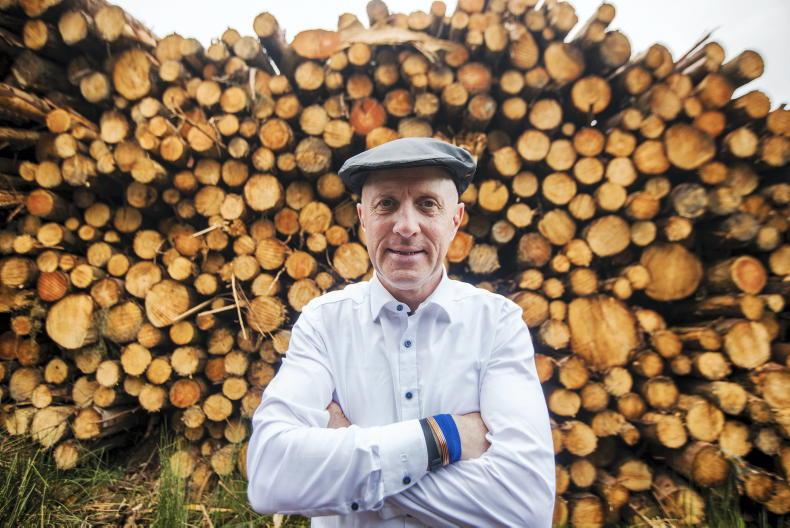It is important that the new Forestry Programme should focus not only on the establishment of new forests, but also on the active management of existing woodlands, including ongoing supports for biodiversity and ecosystem services.
This should not only include funding supports, it should also seek to reduce the administration required to facilitate normal forest management activities such as the requirement for felling licences for standard thinning and related operations.
There are a number of interesting schemes for existing growers in the new programme. These include the following eight different interventions:
Forest creation;Agroforestry;Infrastructure and technology investments;Sustainable Forest Management (SFM);Developing skills and empowering the sector to achieve SFM;Open forests;Climate resilient reforestation;Reconstitution.Two of these schemes are outlined briefly below, but there will be other relevant schemes for farmers and other forest owners.
The Forest Management Plan Scheme (iPLAN scheme) aims to promote more active forest management.
The objective is to develop forests that deliver greater ecosystem services and climate resilience, and more quality roundwood production than forests not subject to such management planning practices.

Donal Whelan.
iPLAN will encourage healthier and more resilient, sustainably managed forests which support the surrounding habitats.
The lack of independent forest certification within the private forest estate needs to be addressed if timber supply is to continue to access markets, both at home and abroad.
An objective of iPLAN is to aid forest owners who wish to achieve certification for their forests.
A new Payment for Ecosystem Services (PES) pilot scheme has been developed for forests that are out of premium payments or never received a grant payment. The details are outlined in the draft document, Ireland’s Forest Strategy Implementation Plan.
Forest owners may be able to select one or more options in accordance with the management practice selected when receiving approval on certain support schemes.
Each option will attract a flat rate premium payment up to seven years.
Payments are based on additional costs incurred and income foregone on the selected options.
Many other schemes will have potential for existing forest owners.
Ultimately, the support for income diversification opportunities is a win-win for the farming community and for the State on climate change mitigation.
Farmers will be adequately funded to plant trees and get remunerated for the public goods their forests provide.
These include carbon sequestration, timber production for building sustainable timber framed homes or for a wider range of forest ecosystem and biodiversity services.
Donal Whelan is technical director of the Irish Timber Growers Association.
It is important that the new Forestry Programme should focus not only on the establishment of new forests, but also on the active management of existing woodlands, including ongoing supports for biodiversity and ecosystem services.
This should not only include funding supports, it should also seek to reduce the administration required to facilitate normal forest management activities such as the requirement for felling licences for standard thinning and related operations.
There are a number of interesting schemes for existing growers in the new programme. These include the following eight different interventions:
Forest creation;Agroforestry;Infrastructure and technology investments;Sustainable Forest Management (SFM);Developing skills and empowering the sector to achieve SFM;Open forests;Climate resilient reforestation;Reconstitution.Two of these schemes are outlined briefly below, but there will be other relevant schemes for farmers and other forest owners.
The Forest Management Plan Scheme (iPLAN scheme) aims to promote more active forest management.
The objective is to develop forests that deliver greater ecosystem services and climate resilience, and more quality roundwood production than forests not subject to such management planning practices.

Donal Whelan.
iPLAN will encourage healthier and more resilient, sustainably managed forests which support the surrounding habitats.
The lack of independent forest certification within the private forest estate needs to be addressed if timber supply is to continue to access markets, both at home and abroad.
An objective of iPLAN is to aid forest owners who wish to achieve certification for their forests.
A new Payment for Ecosystem Services (PES) pilot scheme has been developed for forests that are out of premium payments or never received a grant payment. The details are outlined in the draft document, Ireland’s Forest Strategy Implementation Plan.
Forest owners may be able to select one or more options in accordance with the management practice selected when receiving approval on certain support schemes.
Each option will attract a flat rate premium payment up to seven years.
Payments are based on additional costs incurred and income foregone on the selected options.
Many other schemes will have potential for existing forest owners.
Ultimately, the support for income diversification opportunities is a win-win for the farming community and for the State on climate change mitigation.
Farmers will be adequately funded to plant trees and get remunerated for the public goods their forests provide.
These include carbon sequestration, timber production for building sustainable timber framed homes or for a wider range of forest ecosystem and biodiversity services.
Donal Whelan is technical director of the Irish Timber Growers Association.











SHARING OPTIONS